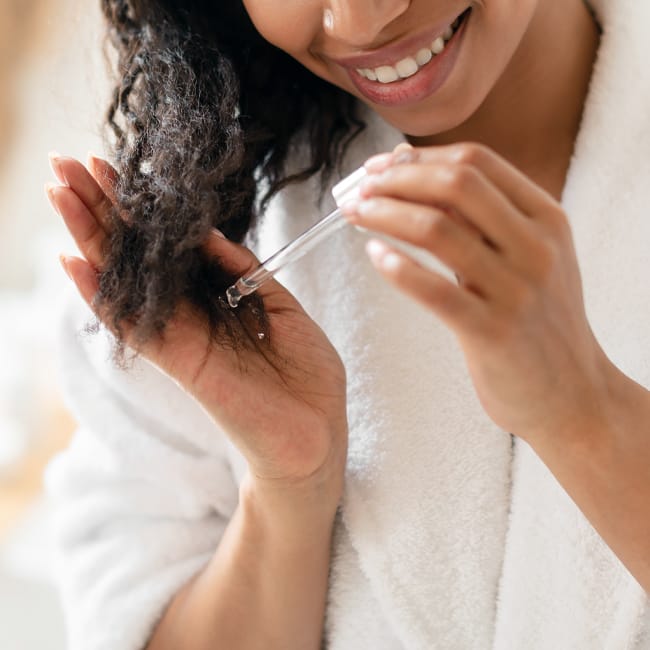This article has been updated since its initial publish date to include more expert insight.
Those pesky puffy eyes are at it again. Just when you thought you had your sleep schedule under control (with a solid seven hours per night, and you can hardly believe it), your under-eye area still seems unable or unwilling to cooperate. Maybe you’re waking up from that good night of rest frustrated to find puffy eye bags staring back at you in the mirror.
Don’t get discouraged. Aside from sleep, your diet could be contributing to under-eye skin issues, as well. Here’s everything you need to know about your puffy eyes, including five diet mistakes that could be contributing to them, especially if you are over 50.


First Off, What Causes Puffy Eyes?
First the facts: there’s an element of under-eye puffiness that is genetic, says Board Certified Dermatologist Dr. Marisa Garshick — but there are also external and lifestyle factors that can also influence it.
“For example, eating too much salt can lead to fluid retention which can cause under-eye puffiness,” Dr. Garshick says. A”llergies can lead to swelling and puffiness in the undereye area and frequent rubbing can make this worse.
Bags under the eyes can be related to various factors including genetics, aging, and other triggers such as chronic rubbing, swelling around the eyes and seasonal allergies.
As it pertains to age, it is often related to weakening of the supporting skin structures around the eyes that allows the fat to be pushed forward.
Additionally, fluid can build up in this area leading to a puffy appearance. This is why lack of sleep can contribute to puffy eyes in the morning as the fluid can build up underneath the eyes. Dehydration may also cause puffy eyes as a result of fluid retention.”

Why Does Eye Puffiness Increase With Age?
It’s pretty simple, really: as we age, we lose collagen and elasticity which can contribute to dark circles and under-eye puffiness, according to Dr. Garshick.
“The lack of collagen and looser skin can lead to protrusion of the fat pads, contributing to swelling,” she adds.

What Five Foods Can You Avoid To Help With Under-Eye Swelling?
Here are some of the dieting mistakes you could be making, according to Caleb Backe, a health and wellness expert for Maple Holistics.

Mistake #1: Not Drinking Enough Water
“Dehydration can also cause the body to retain water, which can result in puffiness,” Backe says. “Drink plenty of water throughout the day to assist your body in flushing out excess fluids and help it to stay hydrated.”

#2: Eating Lots Of Processed Foods
Processed foods contain a lot of sodium, preservatives, and other ingredients that can cause inflammation and puffiness, Backe says. “Consume a diet high in whole, nutrient-dense foods such as fruits, vegetables, whole grains, and lean protein.”

Eating Too Much Salt
Processed foods are often also high in salt and excess salt consumption can cause the body to retain water, resulting in puffiness in the face and eyes. “To limit salt intake, cook with herbs and spices instead of salt, and avoid high-sodium processed and packaged meals,” Backe says.

4. Not Eating Enough Fiber
It isn’t all about what you cut out — what you add in can help a great deal, too. “A low-fiber diet can cause constipation and bloating, which can cause puffiness in the face and eyes,” Backe says. “To promote good digestion and reduce inflammation, eat plenty of fiber-rich foods including fruits, vegetables, whole grains, and legumes.”

5. Consuming Too Much Sugar:
Got a sweet tooth? It’s important to keep sweet treats in moderation, especially if you’re concerned about your skin. “Excess sugar consumption can lead to inflammation in the body, which can contribute to puffiness and eye bags,” Backe says. “Reduce your intake of sugary meals and beverages in favor of natural sweeteners such as fruit or honey.”

What Are Long-Term Habits To Prevent Puffy Eyes?
While you’re making changes to your diet, it’s also a great idea to develop some lifestyle habits that can help prevent puffy eyes. “In general, it is best to avoid rubbing the eyes as this can trigger more inflammation,” says Dr. Garshick.
“Since UV radiation can lead to DNA damage and loss of collagen, wearing sun protection and sunglasses to protect the skin around the eyes helps to prevent collagen loss and therefore may help to prevent lower eye bags.”

The Bottom Line
Because undereye bags can be a result of genetics, in some cases they can be challenging to prevent, Dr. Garshick admits. “That said, there are some treatments that can help improve the overall appearance and prevent them from becoming worse.
Some ways to prevent them are to get more sleep. A lack of sleep can contribute to puffy eyes in the morning as fluid can build up underneath the eyes.
It is also important to treat eczema or allergies as those who have eczema or allergies may be more likely to rub or scratch their under eyes. This can contribute to increased inflammation and puffiness that can be seen in the undereye.”

Eye creams can help to improve the appearance of the under eyes by working to depuff and boost collagen production, Dr. Garshick says.
And, finally, don’t forget that dermatologists are there to help. “There are also procedures that work to tighten the skin, such as lasers, microneedling, or radiofrequency devices that can improve the appearance as well as surgical treatments that can help to reduce the undereye bags,” Dr. Garshick says.


























